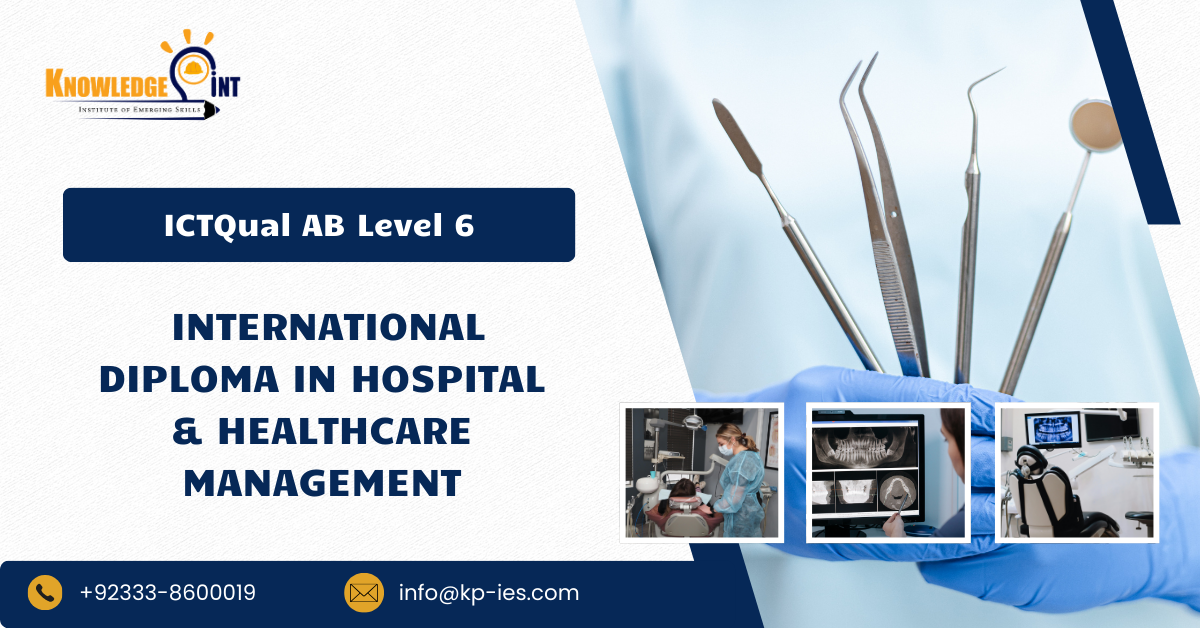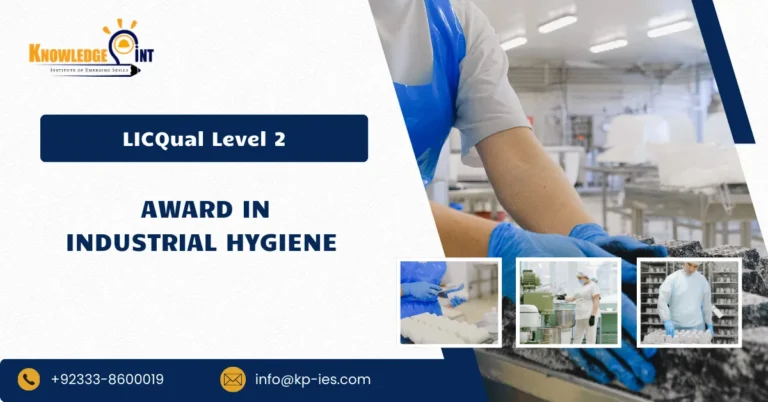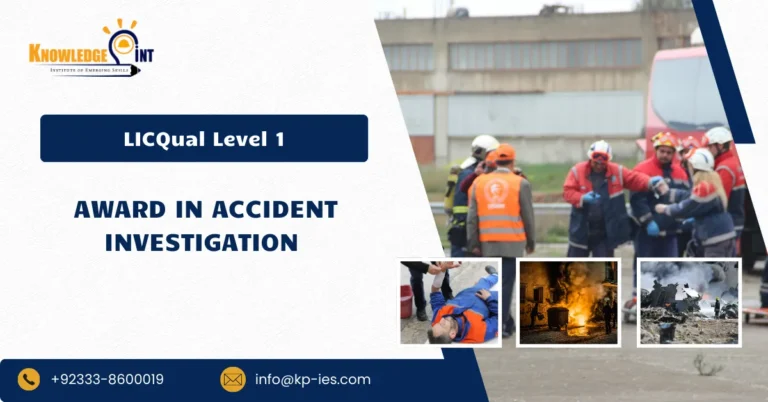The ICTQual AB Level 6 International Diploma in Hospital & Healthcare Management is a comprehensive three-year programme with 360 credits, designed for professionals who aspire to take on leadership and management roles in the healthcare sector. This qualification provides learners with the knowledge, practical skills, and strategic insight needed to manage hospitals, clinics, and healthcare organisations efficiently and effectively.
Learners gain a deep understanding of healthcare systems, policy frameworks, and operational management principles. The curriculum covers key areas including healthcare finance, quality assurance, risk management, human resource management, and strategic planning. By combining theory with practical application, learners develop the ability to make informed decisions that enhance organisational performance and patient care.
The programme emphasises the development of leadership and communication skills, enabling learners to coordinate multidisciplinary teams, manage resources, and drive innovation in healthcare settings. Learners also explore evidence-based management practices, allowing them to evaluate operational challenges, implement effective solutions, and ensure compliance with regulatory standards.
This diploma is highly valuable for professionals aiming to advance their careers in hospital administration, healthcare management, or consultancy roles. Learners acquire specialised expertise in budgeting, resource allocation, healthcare technology, and performance monitoring, preparing them for complex responsibilities in both public and private healthcare environments.
Course Overview
This qualification, the ICTQual AB Level 6 International Diploma in Hospital & Healthcare Management 360 Credits – Three Years, consists of 36 mandatory units.
Year 1: Foundation in Hospital & Healthcare Management
- Introduction to Psychology and Mental Health
- Human Development and Behaviour
- Fundamentals of Cognitive and Behavioural Psychology
- Introduction to Abnormal Psychology
- Principles of Counselling and Therapy
- Research Methods in Psychology
- Psychological Assessment Techniques
- Introduction to Neuropsychology
- Ethics and Professional Practice in Mental Health
- Communication Skills in Clinical Settings
- Health and Safety in Mental Health Environments
- Introduction to Stress and Coping Mechanisms
Year 2: Intermediate Hospital & Healthcare Management
- Strategic Planning and Decision-Making in Healthcare
- Advanced Healthcare Finance and Resource Management
- Human Resource Management in Hospitals
- Patient-Centred Care and Service Excellence
- Healthcare Operations and Logistics
- Risk Management and Compliance in Healthcare
- Project Management in Healthcare Settings
- Evidence-Based Practice in Healthcare Management
- Leadership Skills for Healthcare Professionals
- Healthcare Marketing and Communication Strategies
- Health Policy Analysis and Implementation
- Professional Development and CPD Planning
Year 3: Advanced Hospital & Healthcare Management
- Advanced Strategic Leadership in Healthcare
- Organisational Change and Innovation in Hospitals
- Advanced Healthcare Quality and Performance Improvement
- Healthcare Technology and Digital Transformation
- Financial Planning and Sustainability in Healthcare
- Crisis and Emergency Management in Healthcare
- Integrated Hospital and Clinical Services Management
- Advanced Project and Programme Management
- Healthcare Policy Development and Evaluation
- Research Project or Capstone in Healthcare Management
- Professional Ethics and Legal Considerations in Healthcare
- Advanced CPD and Career Development Strategies
Learning Outcomes for the Level 6 International Diploma in Hospital & Healthcare Management 360 Credits – Three Years:
Year 1: Foundational Knowledge
By the end of Year 1, learners will be able to:
Introduction to Healthcare Systems
- Explain the structure, functions, and roles of healthcare systems globally and locally.
- Analyse key components of hospital and healthcare delivery models.
- Apply foundational knowledge to understand healthcare service operations.
Principles of Hospital Management
- Understand core management concepts applied in hospital settings.
- Demonstrate the ability to plan and organise hospital activities efficiently.
- Analyse managerial challenges and propose solutions for effective operations.
Human Anatomy and Physiology for Managers
- Describe key anatomical and physiological systems relevant to healthcare management.
- Apply this knowledge to support clinical and administrative decision-making.
- Interpret health data with an understanding of human body functions.
Fundamentals of Health Policy and Legislation
- Explain the principles of healthcare policy development and implementation.
- Understand relevant healthcare laws and regulatory frameworks.
- Evaluate the impact of policies and legislation on hospital management.
Healthcare Quality and Safety Standards
- Identify quality improvement methods and safety standards in healthcare.
- Apply protocols to maintain patient safety and service excellence.
- Assess compliance with healthcare quality and safety regulations.
Introduction to Healthcare Finance and Budgeting
- Understand basic financial principles in hospital and healthcare management.
- Prepare and interpret budgets for healthcare services.
- Analyse financial data to support operational decision-making.
Organisational Behaviour in Healthcare
- Examine the behaviour of individuals and teams in healthcare organisations.
- Analyse organisational culture, motivation, and performance factors.
- Apply strategies to enhance teamwork and productivity.
Communication and Interpersonal Skills in Healthcare
- Develop effective communication strategies for clinical and administrative settings.
- Apply interpersonal skills to manage teams and patient interactions.
- Demonstrate clear and professional reporting and documentation.
Research Methods in Healthcare Management
- Understand research design, methodology, and ethical considerations.
- Collect and analyse data to support evidence-based decision-making.
- Apply research findings to improve healthcare management practices.
Health Informatics and Technology Basics
- Understand healthcare information systems and digital tools.
- Apply basic IT solutions for data management and clinical support.
- Evaluate the benefits and limitations of health technology applications.
Ethics and Professional Practice in Healthcare
- Apply ethical principles to decision-making and professional conduct.
- Understand legal responsibilities in healthcare practice.
- Demonstrate professionalism in administrative and clinical interactions.
Health and Safety in Healthcare Environments
- Identify workplace hazards and implement safety protocols.
- Apply risk assessment and control measures in hospital settings.
- Maintain a safe environment for staff, patients, and visitors.
Year 2: Intermediate Proficiency
By the end of Year 2, learners will be able to:
Strategic Planning and Decision-Making in Healthcare
- Develop strategic plans to improve healthcare service delivery.
- Apply decision-making frameworks to complex organisational problems.
- Evaluate outcomes of strategic initiatives for continuous improvement.
Advanced Healthcare Finance and Resource Management
- Analyse advanced financial data for operational and strategic decisions.
- Optimise resource allocation and cost management in healthcare settings.
- Apply financial planning techniques to ensure sustainability.
Human Resource Management in Hospitals
- Manage recruitment, training, and performance of healthcare teams.
- Apply policies for employee engagement and retention.
- Analyse HR strategies to improve organisational efficiency.
Patient-Centred Care and Service Excellence
- Implement practices that enhance patient experience and satisfaction.
- Develop systems to monitor and improve service quality.
- Apply patient feedback to enhance healthcare delivery.
Healthcare Operations and Logistics
- Manage operational processes within hospitals and healthcare services.
- Plan and coordinate supply chains, equipment, and facilities.
- Evaluate efficiency and effectiveness of operational workflows.
Risk Management and Compliance in Healthcare
- Identify and assess risks in hospital and healthcare settings.
- Develop mitigation strategies to ensure regulatory compliance.
- Implement risk management protocols for patient and staff safety.
Project Management in Healthcare Settings
- Plan, execute, and monitor healthcare projects effectively.
- Apply project management tools to achieve objectives within scope and budget.
- Evaluate project outcomes and implement improvements.
Evidence-Based Practice in Healthcare Management
- Apply research evidence to inform management decisions.
- Critically evaluate studies and data for applicability in healthcare settings.
- Integrate evidence into policies, procedures, and operational strategies.
Leadership Skills for Healthcare Professionals
- Demonstrate effective leadership in hospital and clinical teams.
- Apply conflict resolution, motivation, and delegation strategies.
- Evaluate leadership approaches to enhance organisational performance.
Healthcare Marketing and Communication Strategies
- Develop marketing plans to promote hospital services.
- Apply communication strategies for patient engagement and public awareness.
- Analyse the effectiveness of healthcare campaigns and outreach initiatives.
Health Policy Analysis and Implementation
- Critically assess health policies and their impact on hospital management.
- Implement policies in line with organisational goals and legal requirements.
- Evaluate the effectiveness of policy interventions.
Professional Development and CPD Planning
- Identify personal skills and development needs in healthcare management.
- Plan and implement CPD activities for career progression.
- Reflect on professional growth and performance improvements.
Year 3: Advanced Specialization and Application
By the end of Year 3, learners will be able to:
Advanced Strategic Leadership in Healthcare
- Develop and implement strategic initiatives in complex healthcare settings.
- Apply advanced leadership models to manage organisational change.
- Evaluate the impact of strategic decisions on hospital performance.
Organisational Change and Innovation in Hospitals
- Lead change management initiatives to improve healthcare delivery.
- Implement innovative solutions to organisational challenges.
- Assess the outcomes of change processes for continuous improvement.
Advanced Healthcare Quality and Performance Improvement
- Apply quality improvement frameworks to enhance hospital services.
- Analyse performance metrics and implement corrective actions.
- Evaluate patient outcomes to drive continuous service excellence.
Healthcare Technology and Digital Transformation
- Implement digital solutions to optimise clinical and administrative processes.
- Evaluate emerging healthcare technologies for efficiency and patient care.
- Integrate technology into strategic planning and operational workflows.
Financial Planning and Sustainability in Healthcare
- Develop long-term financial strategies for healthcare organisations.
- Apply budgeting and forecasting techniques to ensure sustainability.
- Evaluate financial performance and implement corrective measures.
Crisis and Emergency Management in Healthcare
- Plan and manage emergency response and disaster preparedness.
- Apply risk assessment and mitigation strategies during crises.
- Evaluate effectiveness of crisis management plans and procedures.
Integrated Hospital and Clinical Services Management
- Coordinate multidisciplinary teams and services for optimal care delivery.
- Implement integrated care pathways and service models.
- Assess operational efficiency and patient outcomes in complex settings.
Advanced Project and Programme Management
- Manage large-scale healthcare projects and programmes effectively.
- Apply advanced project planning, monitoring, and evaluation techniques.
- Ensure alignment of projects with strategic organisational goals.
Healthcare Policy Development and Evaluation
- Design and implement policies to meet healthcare objectives.
- Evaluate policy impact on operational, clinical, and financial outcomes.
- Apply evidence and stakeholder feedback to refine policies.
Research Project or Capstone in Healthcare Management
- Conduct an independent research project addressing real-world healthcare challenges.
- Analyse data, interpret findings, and propose evidence-based solutions.
- Present research outcomes in a professional and structured format.
Professional Ethics and Legal Considerations in Healthcare
- Apply ethical frameworks to decision-making in complex scenarios.
- Ensure compliance with legal and professional regulations.
- Evaluate ethical dilemmas and implement solutions aligned with best practices.
Advanced CPD and Career Development Strategies
- Plan and implement long-term career and professional development strategies.
- Identify opportunities for specialisation, leadership, and advanced roles.
- Reflect on practice to enhance skills, knowledge, and professional growth.
Course Benefits of ICTQual AB Level 6 International Diploma in Hospital & Healthcare Management
- Provides comprehensive knowledge of hospital and healthcare management principles.
- Equips learners with skills in healthcare administration, operations, and strategic planning.
- Develops expertise in resource management, financial planning, and budgeting in healthcare settings.
- Enhances understanding of healthcare policies, regulations, and quality assurance standards.
- Offers practical experience through case studies, simulations, and management projects.
- Strengthens leadership, decision-making, and problem-solving skills for healthcare operations.
- Prepares learners for managerial and supervisory roles in hospitals, clinics, and healthcare organizations.
- Improves employability in hospital administration, health services management, and consultancy roles.
- Promotes adherence to ethical practices, patient-centered care, and compliance with healthcare standards.
- Supports continuous professional development and career advancement in healthcare leadership.
- Future Progression
- Pursue Master’s degrees in Healthcare Management, Hospital Administration, Public Health, or Health Policy.
- Obtain professional certifications such as Healthcare Manager Certification, Health Services Administrator, or Clinical Management Specialist.
- Advance into senior roles such as Hospital Administrator, Healthcare Operations Manager, Clinical Services Manager, or Health Policy Advisor.
- Work with hospitals, clinics, health authorities, NGOs, and healthcare consultancy firms.
- Progress into leadership and executive positions, managing healthcare teams, hospital departments, and strategic operations.
- Engage in research and development, improving healthcare delivery, hospital efficiency, and patient safety protocols.
- Transition into specialized areas such as hospital finance, healthcare quality management, patient safety, or healthcare IT systems.
- I can also create a professional blog post combining the course overview, benefits, and future progression for this Hospital & Healthcare Management course, ready for publishing.
After completing this course, learners can progress in the following ways:
- Pursue Master’s degrees in Healthcare Management, Hospital Administration, Public Health, or Health Policy.
- Obtain professional certifications such as Healthcare Manager Certification, Health Services Administrator, or Clinical Management Specialist.
- Advance into senior roles such as Hospital Administrator, Healthcare Operations Manager, Clinical Services Manager, or Health Policy Advisor.
- Work with hospitals, clinics, health authorities, NGOs, and healthcare consultancy firms.
- Progress into leadership and executive positions, managing healthcare teams, hospital departments, and strategic operations.
- Engage in research and development, improving healthcare delivery, hospital efficiency, and patient safety protocols.
- Transition into specialized areas such as hospital finance, healthcare quality management, patient safety, or healthcare IT systems.







